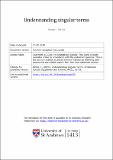Files in this item
Understanding singular terms
Item metadata
| dc.contributor.author | Dickie, Imogen | |
| dc.date.accessioned | 2022-06-30T23:38:38Z | |
| dc.date.available | 2022-06-30T23:38:38Z | |
| dc.date.issued | 2020-07-01 | |
| dc.identifier.citation | Dickie , I 2020 , ' Understanding singular terms ' , Aristotelian Society Supplementary Volume , vol. 94 , no. 1 , pp. 19-55 . https://doi.org/10.1093/arisup/akaa003 | en |
| dc.identifier.issn | 0309-7013 | |
| dc.identifier.other | PURE: 261252780 | |
| dc.identifier.other | PURE UUID: 60b0af08-d0a6-4c0b-a467-372ed4f7a14c | |
| dc.identifier.other | ORCID: /0000-0001-9346-643X/work/77893860 | |
| dc.identifier.uri | https://hdl.handle.net/10023/25592 | |
| dc.description.abstract | This paper uses a puzzle arising from cases of felicitous underspecification in uses of demonstratives to motivate a new model of communication using singular terms. | |
| dc.language.iso | eng | |
| dc.relation.ispartof | Aristotelian Society Supplementary Volume | en |
| dc.rights | Copyright © 2020 The Aristotelian Society. This work has been made available online in accordance with publisher policies or with permission. Permission for further reuse of this content should be sought from the publisher or the rights holder. This is the author created accepted manuscript following peer review and may differ slightly from the final published version. The final published version of this work is available at https://doi.org/10.1093/arisup/akaa003 | en |
| dc.subject | Underspecification | en |
| dc.subject | Communication | en |
| dc.subject | Demonstratives | en |
| dc.subject | Singular terms | en |
| dc.subject | B Philosophy (General) | en |
| dc.subject | T-NDAS | en |
| dc.subject | BDC | en |
| dc.subject.lcc | B1 | en |
| dc.title | Understanding singular terms | en |
| dc.type | Journal article | en |
| dc.description.version | https://doi.org/Postprint | en |
| dc.contributor.institution | University of St Andrews. Philosophy | en |
| dc.identifier.doi | https://doi.org/10.1093/arisup/akaa003 | |
| dc.description.status | Peer reviewed | en |
| dc.date.embargoedUntil | 2022-07-01 |
This item appears in the following Collection(s)
Items in the St Andrews Research Repository are protected by copyright, with all rights reserved, unless otherwise indicated.

